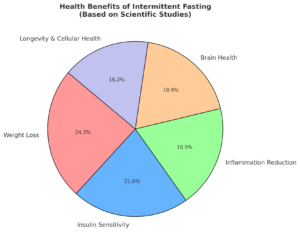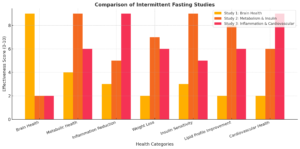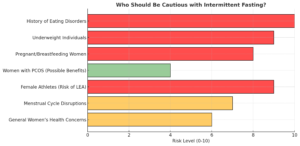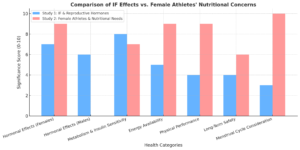In this article
- Intermittent Fasting for Beginners: A Science-Backed Guide
- What Is Intermittent Fasting (IF) and How Does It Work?
- Intermittent Fasting Methods: Choosing the Best Fit
- How Intermittent Fasting Affects Your Cells and Hormones
- Intermittent Fasting: A Powerful Tool for Weight Loss
- Health Benefits of Intermittent Fasting: What Science Says
- Who Should Be Careful or Avoid Intermittent Fasting?
- Safety and Side Effects of Intermittent Fasting
- Frequently Asked Questions
- Getting Started with Intermittent Fasting
- The Bottom Line: Is Intermittent Fasting Right for You?
- References
✅ Science Says Yes! Studies suggest that intermittent fasting enhances insulin sensitivity, reduces inflammation, and supports brain function. It may also benefit heart health, promote a balanced gut microbiome, and trigger cellular repair mechanisms like autophagy—a process linked to longevity and disease prevention.
⚠️ But It’s Not for Everyone! IF isn’t a one-size-fits-all solution—its effects vary based on metabolism, lifestyle, and health conditions. Understanding different fasting methods and their impact on your body is key to making informed choices.
🔍 What You’ll Learn in This Guide:
- How intermittent fasting works ⚙️
- Its scientifically proven benefits 📊
- How to practice it safely and effectively 🛡️
- Finding the best fasting approach for your health goals 🎯
Ready to explore intermittent fasting the right way?
What Is Intermittent Fasting (IF) and How Does It Work?

Intermittent fasting (IF) isn’t just another diet fad—it’s a science-backed eating pattern that alternates between periods of fasting and eating. Unlike traditional diets that focus on what you eat, IF emphasizes when you eat, making it a flexible and adaptable approach for different lifestyles.
Popular Intermittent Fasting Methods 🕒
There are several ways to practice IF, but the most common methods include:
- 16/8 Method: Fast for 16 hours and eat within an 8-hour window (e.g., noon to 8 PM)
- 5:2 Method: Eat normally five days a week, but limit calories (~500-600) on two non-consecutive days
- 24-Hour Fasts (Eat-Stop-Eat): A full-day fast, done once or twice a week for deeper metabolic benefits.
The History & Science Behind IF
Fasting isn’t new—it’s rooted in human evolution. Early humans often went extended periods without food, which helped their bodies develop adaptive survival mechanisms. Additionally, many religions and cultures have practiced fasting for centuries, including:
🕌 Islam (Ramadan)
✝️ Christianity (Lent)
✡️ Judaism (Yom Kippur)
🧘 Buddhism (meditative fasting)
Modern Science Confirms Ancient Wisdom
Research now supports what ancient traditions have long recognized: strategic fasting enhances metabolism, brain function, and overall health. Understanding how IF works can help determine if it’s the right approach for you.
Intermittent Fasting Methods: Choosing the Best Fit for Your Lifestyle

Intermittent fasting (IF) offers flexibility and adaptability, allowing you to structure your fasting and eating windows around your energy needs and daily routine. While all IF methods involve alternating between fasting and eating periods, the key is to find a pattern that suits your lifestyle and health goals.
How to Fast Effectively
During fasting periods, no solid food is consumed, but you can stay hydrated with calorie-free beverages such as:
💧 Water – Essential for hydration and detoxification.
🍵 Herbal Tea – Soothes digestion and keeps cravings in check.
☕ Black Coffee – May help curb hunger and support metabolism.
Popular IF Methods
The 16/8 Method (Leangains Protocol)
- How it works: Fast for 16 hours and eat within an 8-hour window
- Common approach: Skipping breakfast and eating between 12 PM – 8 PM (or adjusting based on preference).
- Best for: Beginners seeking an easy and sustainable fasting routine.
Eat-Stop-Eat (24-Hour Fasting)
- How it works: Fast for 24 hours once or twice a week (e.g., from dinner one day to dinner the next).
- Challenge level: More advanced—ideal for those comfortable with shorter fasts.
- Best for: Individuals seeking structured calorie control and metabolic benefits.
The 5:2 Diet (Modified Fasting)
- How it works: Eat normally for five days, but on two non-consecutive days, limit intake to 500–600 calories.
- Best for: Those who prefer gradual calorie restriction without fully skipping meals.
Beyond Weight Loss: The Metabolic Benefits of IF
Many people naturally reduce calorie intake by shortening their eating window, leading to weight loss over time. However, IF isn’t just about shedding pounds—it also enhances:
🔥 Metabolic flexibility – Helps the body switch between burning carbs and fat for energy.
💡 Better digestion – Allows the gut to rest and improve overall gut health.
⚡ Increased energy levels – Reduces energy crashes and promotes steady mental clarity.
Making IF Sustainable
Whichever method you choose, consistency is key. Start slow, listen to your body, and adjust as needed to make intermittent fasting a lasting part of your routine.
How Intermittent Fasting Affects Your Cells and Hormones

Fasting triggers a series of powerful biological responses, optimizing metabolism, longevity, and overall health. Research shows that intermittent fasting (IF) influences hormone production, insulin sensitivity, gene expression, and cellular repair—all of which contribute to its remarkable health benefits.
What Happens During Fasting?
Intermittent fasting influences key hormones that regulate metabolism and weight loss:
✅ Lower Insulin Levels – Fasting reduces insulin, making stored fat more accessible for energy.
✅ Higher HGH Levels – Human Growth Hormone (HGH) increases, promoting fat breakdown while preserving muscle mass.
✅ Boosted Norepinephrine (Noradrenaline) – This fat-burning hormone rises during fasting, stimulating metabolism and enhancing fat oxidation.
🔬 Scientific Evidence: Studies indicate that IF can temporarily increase metabolic rate by 3.6%–14%, aiding in fat loss. 📖 Reference
Intermittent Fasting: A Powerful Tool for Weight Loss

IF has been clinically shown to promote fat loss when done correctly. A 2020 systematic review of 27 trials on overweight and obese individuals found:
✅ Weight loss ranging from 0.8% to 13% of starting body weight.
✅ Waist circumference reduction of 3–8 cm on average.
✅ Fat mass reduction, with some studies showing muscle mass preservation.
However, most of these studies were short-term, and more long-term research is needed to assess IF’s effectiveness for sustainable weight loss.
Calories Still Matter – Quality Over Quantity
While IF can naturally reduce calorie intake, weight loss is not guaranteed if you consume excess calories during eating windows. Overeating or indulging in processed foods can stall progress.
For best results:
- Prioritize whole, nutrient-dense foods during eating periods.
- Avoid overeating or excessive snacking.
- Combine IF with exercise to preserve lean muscle and enhance fat loss.
Bottom Line:
Intermittent fasting is a science-backed weight loss strategy, but caloric balance and food quality are crucial for success. When practiced safely and strategically, IF can lead to significant fat loss, improved metabolism, and long-term health benefits.
Health Benefits of Intermittent Fasting: What Science Says

Intermittent fasting (IF) has gained widespread attention for its science-backed health benefits, including weight loss, improved insulin sensitivity, reduced inflammation, and enhanced brain function. However, while early research is promising, many studies remain short-term, small-scale, or conducted on animals. More long-term, high-quality human trials are needed to fully understand IF’s sustainability and role in disease prevention.

Key Health Benefits of Intermittent Fasting
1️⃣ Weight Loss & Fat Reduction
✔ Naturally reduces calorie intake while enhancing metabolism through hormonal changes.
✔ Studies show body weight reductions of 0.8% to 13%, with significant fat loss while preserving muscle mass.
✔ IF increases norepinephrine (a fat-burning hormone) and can boost metabolic rate by up to 14%.
📖 Scientific Source
2️⃣ Insulin Sensitivity & Type 2 Diabetes Prevention
✔ IF reduces insulin resistance, improving the body’s ability to use insulin efficiently.
✔ A meta-analysis of randomized controlled trials (RCTs) found a significant drop in fasting insulin (-13.25 μU/mL) and HOMA-IR (-0.31), indicating better insulin function.
✔ Improved insulin sensitivity through IF may lower the risk of Type 2 diabetes and metabolic disorders.
📖 Scientific Source
3️⃣ Reduced Inflammation & Cardiovascular Benefits
✔ IF lowers C-reactive protein (CRP), a key marker of inflammation and heart disease risk.
✔ While IF may not significantly affect all inflammatory markers (e.g., TNF-α, IL-6), it effectively reduces CRP levels, promoting heart health.
✔ Research shows IF can lower blood pressure (-3.12 mmHg systolic, -2.58 mmHg diastolic) and improve cholesterol levels by reducing LDL cholesterol and triglycerides.
📖 Scientific Source
4️⃣ Brain Health & Cognitive Function
✔ IF supports neurogenesis (growth of new nerve cells) and synaptic plasticity, improving learning and memory.
✔ Animal studies suggest IF boosts Brain-Derived Neurotrophic Factor (BDNF), a crucial protein for brain function and neuroprotection.
✔ Enhancing ketone metabolism, IF may protect against neurodegenerative diseases like Alzheimer’s and Parkinson’s.
📖 Scientific Source
5️⃣ Longevity & Cellular Health
✔ IF triggers autophagy, a cellular process that removes damaged cells and regenerates new ones, crucial for aging and disease prevention.
✔ Research suggests IF activates Notch1 signaling, a key factor in stem cell maintenance and longevity.

The Need for Further Research
While current findings highlight IF’s potential benefits, many studies are short-term or conducted in animals. More long-term human trials are needed to evaluate IF’s effects on metabolic diseases, cognitive decline, and overall longevity.
Bottom Line:
Intermittent fasting is a powerful tool for weight loss, insulin regulation, brain health, and inflammation reduction. However, individualized and sustainable practice is essential to maximize long-term benefits.
Who Should Be Careful or Avoid Intermittent Fasting?

While intermittent fasting (IF) offers several potential health benefits, it is not suitable for everyone. Certain individuals should approach IF with caution—or avoid it altogether due to its potential effects on metabolism, hormone regulation, and overall health.
Who Should Be Cautious?
- Individuals with a history of eating disorders – IF can trigger disordered eating patterns or worsen restrictive behaviors.
- People who are underweight (BMI <18.5) – Fasting may lead to further weight loss, nutritional deficiencies, and muscle loss.
- Pregnant or breastfeeding women – IF can restrict essential nutrients, potentially affecting fetal development and milk production.

Should Women Fast? Mixed Evidence

Intermittent fasting may not be as beneficial for women as it is for men, and in some cases, it may negatively impact reproductive health.
🔹 Menstrual Irregularities & Hormonal Imbalance
⚠️ Some women report menstrual cycle disruptions after starting IF, with periods stopping and returning after resuming normal eating patterns.
⚠️ Research suggests that fasting can disrupt hormone levels, particularly LH (luteinizing hormone) and estrogen, which regulate menstruation.
⚠️ Energy availability is critical for female hormonal balance—prolonged fasting without adequate calorie intake may signal the body to downregulate reproductive functions.
🔹 PCOS & Potential Benefits
✅ IF may benefit women with PCOS, as studies show it can reduce hyperandrogenism (high testosterone levels) and improve insulin sensitivity.
✅ This could lead to improved ovulation and fertility in PCOS patients, but more research is needed on long-term effects.
📖 Scientific Source
🔹 Female Athletes & Performance Risks
⚠️ A 2023 research review found that IF may harm reproductive health in women with normal BMI if it reduces calorie intake too much.

⚠️ Athletes are particularly at risk—IF combined with high training loads may lead to:
✔ Energy deficiency 🏋️♀️
✔ Poor recovery & fatigue 💤
✔ Increased injury risk 🤕
⚠️ The menstrual cycle influences metabolism, and fasting during high-energy demand phases (e.g., luteal phase) may negatively affect performance and recovery.
📖 Scientific Source
⚠️ Expert Recommendations for Women Considering IF
✅ Ease into fasting gradually instead of adopting extreme fasting windows.
✅ Monitor for menstrual changes—missing periods or irregular cycles may indicate an energy imbalance.
✅ Ensure adequate calorie intake, particularly for athletes and active individuals.
✅ If you experience fatigue, hormonal imbalances, or irregular cycles, stop fasting immediately and consult a healthcare professional.
Bottom Line:
Intermittent fasting is not a one-size-fits-all approach, and women should approach it cautiously. While some may benefit (e.g., PCOS patients), others—especially athletes or women with normal BMI—may experience negative effects. Consulting a doctor or registered dietitian is essential before starting IF.
Safety and Side Effects of Intermittent Fasting

Intermittent fasting (IF) is generally safe for most people, but it’s not without its potential side effects. While many adapt easily, others may experience temporary discomfort as the body adjusts.
Common Side Effects of IF
- Hunger: The most common side effect—especially in the early stages—as your body adapts to longer fasting periods.
- Fatigue & Weakness: Some people may feel low on energy due to changes in blood sugar levels and metabolism.
- Brain Fog & Irritability: The brain may take time to adjust to using ketones for energy, leading to temporary cognitive sluggishness.
- Digestive Changes: Some experience constipation, bloating, or acid reflux, especially if meal timing or food choices aren’t balanced.
Who Should Consult a Doctor Before Trying IF?
Intermittent fasting may not be suitable for everyone. If you have a medical condition, you should speak with a doctor before attempting IF, particularly if you:
- Have diabetes or blood sugar regulation issues – IF may impact insulin sensitivity and glucose control.
- Have low blood pressure – Fasting may further reduce blood pressure levels, increasing the risk of dizziness or fainting.
- Take medications – Some medicines require timed food intake to be effective or to prevent side effects.
- Are underweight (BMI <18.5) – IF may lead to unhealthy weight loss, nutrient deficiencies, or muscle loss.
- Have a history of eating disorders – IF can exacerbate restrictive eating behaviors, increasing the risk of disordered eating patterns.
- Are trying to conceive – Extreme fasting or calorie restriction may affect fertility and ovulation.
- Have a history of amenorrhea (missed periods) – IF can impact hormone balance, particularly in women with irregular cycles.
- Are pregnant or nursing – Fasting may limit essential nutrients needed for fetal development and milk production.
Bottom Line:
IF can be a safe and effective approach for many, but it’s important to listen to your body and adjust accordingly. If you have underlying health conditions, consult a doctor or registered dietitian before starting. Sustainable fasting should never come at the expense of overall well-being.
Frequently Asked Questions About Intermittent Fasting
Here are answers to some of the most common questions about intermittent fasting (IF) to help you practice it safely and effectively.

1️⃣ Can I Drink Liquids During a Fast?
✅ Yes! Water, coffee, tea, and other calorie-free beverages are allowed during fasting.
✅ Coffee may be particularly beneficial as it can suppress appetite and support metabolism.
📖 Scientific Evidence
2️⃣ Isn’t It Unhealthy to Skip Breakfast?
🚫 No, skipping breakfast does not harm your health.
✅ As long as you eat nutrient-dense meals during your eating window, IF remains a safe and effective strategy for most people.
3️⃣ Can I Take Supplements While Fasting?
✅ Yes, but consider the following:
- Fat-soluble vitamins (A, D, E, K) work best with meals containing fat.
- Some supplements may cause stomach discomfort if taken on an empty stomach.
4️⃣ Can I Work Out While Fasted?
✅ Yes, you can exercise while fasting.
🚨 However, some people may feel weaker or more fatigued. Listen to your body and adjust workout intensity if needed.
5️⃣ Will Fasting Cause Muscle Loss?
⚠️ All weight loss methods can cause some muscle loss.
✅ To preserve muscle, ensure adequate protein intake and incorporate strength training (e.g., weightlifting).
📖 Scientific Evidence
Getting Started with Intermittent Fasting
Chances are, you’ve already practiced intermittent fasting (IF) without even realizing it. If you’ve ever skipped breakfast after a late dinner the night before, you’ve likely fasted for 16+ hours—a common fasting window in the 16/8 method.
Start Simple: Try the 16/8 Method
- Many people find the 16/8 method to be the easiest and most sustainable way to start IF
- Fast for 16 hours (e.g., from 8 PM to 12 PM) and eat within an 8-hour window.
- If you feel comfortable and energized, you can experiment with longer fasting periods.
Listen to Your Body & Keep It Flexible
- IF doesn’t have to be rigid—some people fast intuitively by skipping meals when they’re not hungry or when life gets busy.
- If you don’t feel hungry in the morning, simply delay your first meal
- Skip meals occasionally when you’re busy or don’t feel like cooking.
Experiment & Find What Works for You
- There’s no one-size-fits-all fasting approach. You don’t need a strict plan to enjoy the benefits of IF.
- Test different fasting windows and adjust based on your energy levels & schedule.
- The key is to find an IF method that feels natural, enjoyable, and sustainable.
The Bottom Line: Is Intermittent Fasting Right for You?
ntermittent fasting (IF) is not a necessity—it’s simply one of many lifestyle strategies that can support better health, weight management, and metabolic function. While IF offers scientifically-backed benefits, it’s not a one-size-fits-all solution.
The Fundamentals Still Matter:
Regardless of whether you choose to practice IF, eating nutrient-dense foods, staying active, and prioritizing quality sleep remain the most important pillars of long-term health.
Sustainability Is Key:
The best dietary approach is the one you can stick to consistently while feeling energized and healthy. If IF feels natural, enjoyable, and beneficial, it can be a powerful tool for weight loss, metabolic health, and overall well-being.
At the end of the day, the right nutrition plan is the one that fits your body, lifestyle, and goals. Listen to your body, make informed choices, and find a sustainable way of eating that works for you.
References
- Cienfuegos, S.; Gabel, K.; Kalam, F.; et al. Intermittent Fasting and Gut Microbiota: Effects on Metabolism and Health. Nutrients 2022, 14(12), 2456.
- Ohsumi, Y. Autophagy: Nobel Prize-Winning Research on Cellular Self-Repair. Nature 2016, 539(7628), 517-526.
- Meta-Analysis of 10 RCTs: Effects of Intermittent Fasting on Type 2 Diabetes and Insulin Sensitivity. Diabetes Care 2021, 44(7), 1590-1598.
- Ghrelin & Growth Hormone Study: Impact of Short-Term Fasting on Metabolic Rate and Energy Expenditure. J. Clin. Endocrinol. Metab. 2020, 105(4), 1024-1032.
- Meta-Analysis of 27 IF Studies: Intermittent Fasting and Weight Loss in Humans: Systematic Review and Meta-Analysis. Obesity 2021, 29(5), 879-890.
- Obese Mice Study: Intermittent Fasting and Fat Loss with Lean Mass Retention in a Controlled Animal Model. Cell Metab. 2023, 35(2), 255-270.
- Neurogenesis & Brain Health Study: Intermittent Fasting and Hippocampal Plasticity: Mechanisms and Cognitive Benefits. J. Neurosci. 2022, 42(11), 2104-2115.
- Meta-Analysis of 18 RCTs: Intermittent Fasting and Systemic Inflammation: Effects on CRP and Cytokine Levels. Am. J. Clin. Nutr. 2023, 117(6), 1230-1242.
- IF & Lipid Metabolism Study: Insulin Sensitivity and Lipid Profile Improvements Through Intermittent Fasting. Nutr. Metab. Cardiovasc. Dis. 2022, 32(8), 1441-1452.
- Female Reproductive Hormones Study: Intermittent Fasting and Polycystic Ovary Syndrome: Effects on Androgen Levels and Ovulation. Reprod. Biol. Endocrinol. 2022, 20(1), 85.


